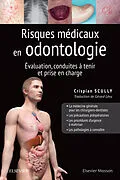Le chirurgien-dentiste est quotidiennement confronté à des patients dont les soins nécessitent des connaissances de médecine générale. Ces patients obligent le chirurgien-dentiste à intégrer sa pratique dans un contexte clinique plus global.
Ainsi, cet ouvrage synthétique fournit une vision complète des principales pathologies et des patients particuliers : patients jeunes, âgés, souffrants de pathologies cardiovasculaires, digestives, respiratoires, urinaires, nerveuses, etc.
Au travers de 10 chapitres, ce guide donne les clés nécessaires pour mettre en lien ce contexte clinique avec les soins dentaires, en donnant systématiquement la définition, l'étiopathogénie, le tableau clinique, le diagnostic, le traitement et les considérations dentaires spécifiques, dont il faut tenir compte.
Il fait également état des risques médicaux possibles et des situations d'urgence pouvant survenir et des outils nécessaires à leur évaluation et prise en charge, au travers de nombreuses conduites à tenir.
Professor Scully was a Director of the WHO Collaborating Centre for Oral Health-General Health; King James IV Professor at the Royal College of Surgeons of Edinburgh and Emeritus Professor, University College London (UCL). He was a Specialist in Oral Medicine, in Special Care Dentistry and in Oral Surgery. He was a Founder member of European Association for Oral Medicine and a Founder member of the UK Academy of Medical Sciences. He has the distinction of Commander of the British Empire (CBE) and he has been awarded several University Doctorates (Athens, Granada, Helsinki, Pretoria, Santiago de Compostela). Professor Scully was an Editor of Oral Diseases, and Medicina Oral Cirugía Oral Patología Bucal Associate Editor and was on the Editorial Boards of Acta-Oto-Laryngologica and Dental Update. He founded and was Editor of Oral Oncology. Professor Scully has presented continuing education programmes throughout the world and has published over 1000 scholarly works and 45 books (34 authored and 11 edited).
Ainsi, cet ouvrage synthétique fournit une vision complète des principales pathologies et des patients particuliers : patients jeunes, âgés, souffrants de pathologies cardiovasculaires, digestives, respiratoires, urinaires, nerveuses, etc.
Au travers de 10 chapitres, ce guide donne les clés nécessaires pour mettre en lien ce contexte clinique avec les soins dentaires, en donnant systématiquement la définition, l'étiopathogénie, le tableau clinique, le diagnostic, le traitement et les considérations dentaires spécifiques, dont il faut tenir compte.
Il fait également état des risques médicaux possibles et des situations d'urgence pouvant survenir et des outils nécessaires à leur évaluation et prise en charge, au travers de nombreuses conduites à tenir.
Professor Scully was a Director of the WHO Collaborating Centre for Oral Health-General Health; King James IV Professor at the Royal College of Surgeons of Edinburgh and Emeritus Professor, University College London (UCL). He was a Specialist in Oral Medicine, in Special Care Dentistry and in Oral Surgery. He was a Founder member of European Association for Oral Medicine and a Founder member of the UK Academy of Medical Sciences. He has the distinction of Commander of the British Empire (CBE) and he has been awarded several University Doctorates (Athens, Granada, Helsinki, Pretoria, Santiago de Compostela). Professor Scully was an Editor of Oral Diseases, and Medicina Oral Cirugía Oral Patología Bucal Associate Editor and was on the Editorial Boards of Acta-Oto-Laryngologica and Dental Update. He founded and was Editor of Oral Oncology. Professor Scully has presented continuing education programmes throughout the world and has published over 1000 scholarly works and 45 books (34 authored and 11 edited).
Titel
Risques médicaux en odontologie
Untertitel
Evaluation, conduites tenir et prise en charge
Autor
EAN
9782294758133
Format
E-Book (epub)
Hersteller
Genre
Veröffentlichung
16.08.2018
Digitaler Kopierschutz
Adobe-DRM
Dateigrösse
71.7 MB
Anzahl Seiten
488
Unerwartete Verzögerung
Ups, ein Fehler ist aufgetreten. Bitte versuchen Sie es später noch einmal.
